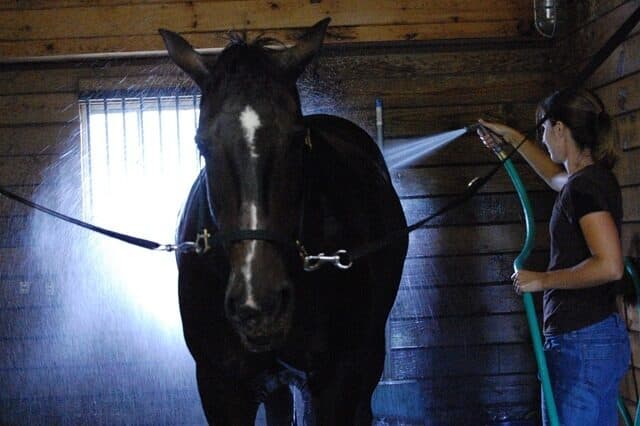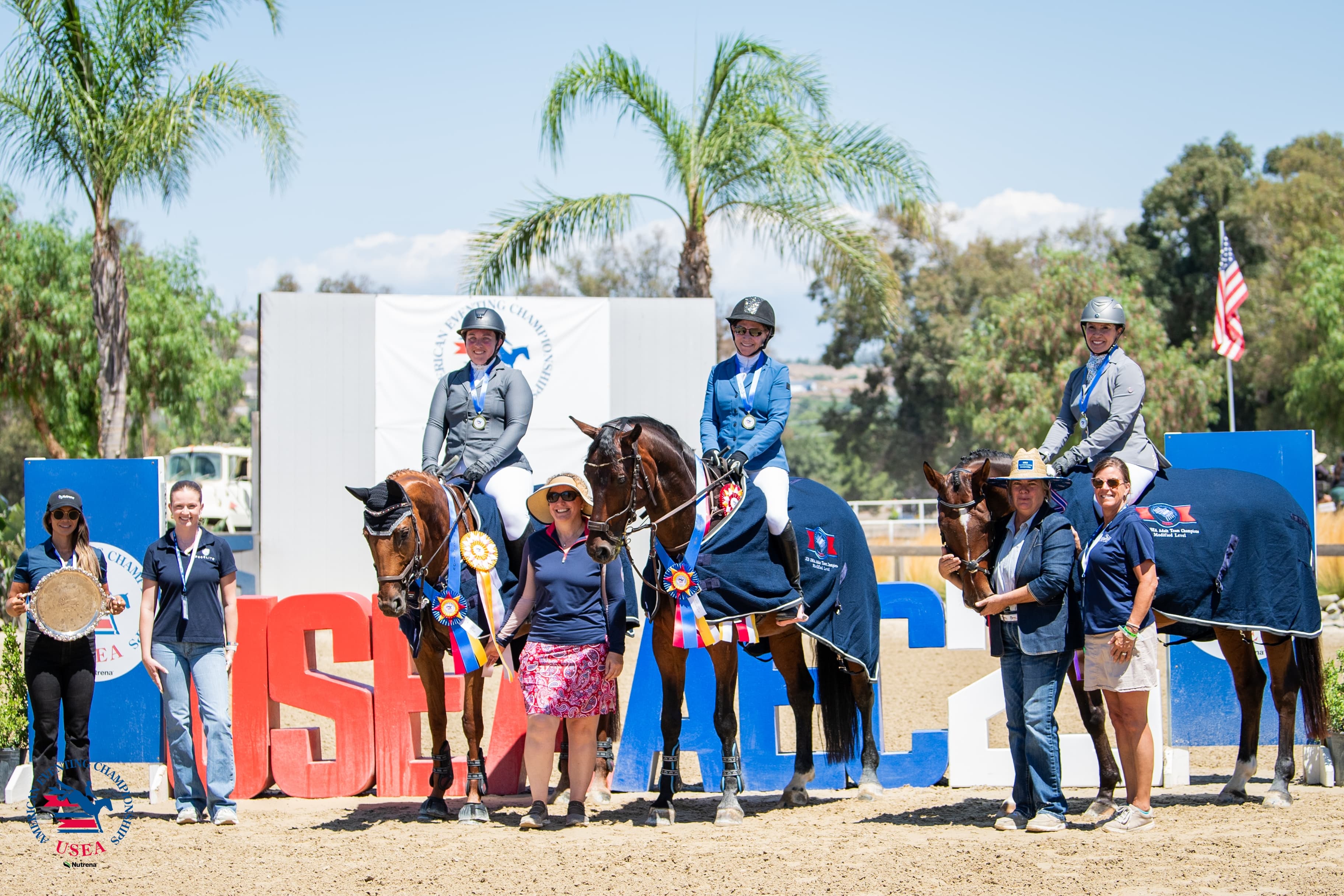Advice For Horse Safety During Hot Weather

With summer on its way and the temperatures heating up in many parts of the U.S., it is important to know the facts to keeping your horse cool and safe when the heat rises. Dr. David Marlin shares information on proper horse safety in hot weather.
Acclimatization
If the weather suddenly becomes warmer, don’t attempt to try acclimatize your horse by exercising it in the hottest parts of the day if you are competing within a few days. When warm/hot weather appears suddenly, no horses will be acclimatized to training/competing in the heat. Acclimatization takes 2-3 weeks of regularly exercising in the heat. If you start now your horse is likely to be worse by the weekend as in the first 3-5 days horses’ ability to deal with heat and exercise gets worse before they start to improve and competing could be a major health risk.
Traveling
If you are traveling with your horse in warm weather, leave very early or as late as possible, preferably after sunset. It’s not only that its cooler but the chance of hitting traffic is less. The worst thing for a horse is to be standing in a trailer or lorry that is stationary on hot roads at temperatures that may reach high 30° Celsius (86° Fahrenheit) …. unless of course you have air-conditioning. Horses may lose 3-5kg per hour in warm weather and so could be considerably dehydrated after a 4-5 hour journey in the hotter parts of the day.
Competition
You must accept that your horse will not be able to do the same amount of exercise in the heat as it would in cooler weather. Your horse will produce more adrenaline in hot weather and use up muscle energy stores (glycogen) more quickly. Dehydration also increases adrenaline which compounds the problem. Therefore, if you compete just as hard as you would in cooler weather your horse will tire earlier. If you don’t compete as hard your speed will be slower but your horse will be at a lower risk of heat related illness.
Water
Your horse must have clean water at all times. Your horse may drink considerably more in hot weather. If you use buckets you should consider putting another bucket in the stable. Allow your horse water right up until the time you are going to take him to compete. You can also allow him to drink after warming-up and before competing. He will have a very strong urge to drink immediately after exercise and you should allow him to do so. There are many myths about water and exercise. Cold water does not cause problems. Large volumes of water do distend the stomach but that is also the mechanism by which the stomach knows to empty and allow the water through into the small intestine.
Electrolytes
If you have not been feeding electrolytes on a regular basis then do not try to suddenly load in large amounts (e.g. 100-200g). It will not replace any bodily deficits and it may cause feed refusal or gastro-intestinal upset. If you have not been feeding electrolytes regularly then start by feeding 50g of a balanced electrolyte split between at least two feeds. Do not be tempted to try and load the day before or the day of competition. If you are providing electrolytes at or during e.g. before or after competing or between rounds or phases (e.g. eventing, SJ, dressage) or during competition (e.g. endurance), then you can provide electrolytes in feed or in pastes or in water. If you provide electrolytes in water then your horses should have the option to drink plain water as well. You can offer the electrolyte water first and if this is refused offer then plain water. There is no difference in speed of uptake between electrolytes in water or dry electrolytes given in feed. If you provide electrolytes in water then aim for a ratio of around 5-6g electrolyte for every litre of water. In studies the acceptance decreases as the ratio increases above this (i.e. more horses will refuse if given water with 9-10g electrolyte per litre of water).
Warming-up
Horses need less time for soft tissues (muscle, tendon, ligament, etc) to “warm-up” in hot weather. You should aim to reduce the time you spend warming-up by around 50%. After warming-up you should try to find shade to stand in and you can cool your horse with water and ice (if available). Reducing your horses’ body temperature does not counteract the other physiological effects of warming-up.
Cooling
The most effective way to cool a horse is with cold water all over the body surface, especially in front of and behind the saddle if you are riding and being given water containers to pour on. You do not need to concentrate on large veins or arteries or large muscle groups and in fact this will be much less effective.
Rugs and Clothing
If you do put on a sheet then make sure it’s a white one. White material reflects some heat whilst dark colors absorb radiant heat. The same goes for your own clothing. If possible ride in white and wear a white helmet.
Signs that your horse may be suffering from the heat include:
Lethargy
Panting (faster shallow breathing)
Nostril flaring
Increased rectal temperature
Decreased appetite and thirst
Dark urine
Reduced urination
Reduced performance
Dark mucous membranes
Muscle spasms
“Thumps” (synchronous diaphragmatic flutter)
Abnormal (irregular) heart rhythm
Slow recovery after exercise
This is often referred to as heat exhaustion but if not managed properly and quickly can progress to heat stroke. This may include ataxia (being unsteady on the feet) and or collapse. If your horse does go down then continue to cool-it aggressively and send for a vet!
IF YOU ARE CONCERNED THAT YOUR HORSE MAY HAVE SEVERE HEAT STROKE THEN IT’S IMPORTANT THAT YOU SEEK VETERINARY ADVICE AS SOON AS POSSIBLE.
Severe heat stroke/heat exhaustion can lead to renal failure, myopathy (muscle damage), laminitis, liver failure and can be fatal if not treated promptly. If you think your horse may be suffering heat related illness, move your horse into the shade and start to cool by pouring large amounts of water all over the body. If a hose is available, then use that. If ice is available, then use that to cool the water. If your horse has developed heat exhaustion/heat stroke you may need to cool continuously for 10-15 minutes before you start to see an effect. You are extremely unlikely to do any harm and your horse is at much greater risk from not being cooled. If shade is available nearby and the horse is steady on its feet, then move into the shade whilst continuing to
About Dr. David Marlin
David Marlin studied physiology and computing at Stirling University in Scotland (UK) from 1978 to 1981. David then trained with dressage rider and coach Judy Harvey (Fellow of the British Horse Society (FBHS) and Federation Equestre Internationale (FEI) International dressage judge; Judy Harvey is a successful rider and a well‐respected trainer hosting clinics all over the world. He obtained his PhD from Loughborough University (the leading sports University in the UK) in 1989 after 4 years studying the responses of Thoroughbred racehorses to exercise and training at the world famous Animal Health Trust in Newmarket, UK.
He has worked as a consultant to the British Equestrian Teams since 1994 and was a member of the World Class Performance Scientific Advisory Group chaired by John McEwen when it was created in 2006. He was also trainer for the British Endurance Team when they won the Silver Medal at the Endurance World Championships in Compiegne (France) in 2000.
David’s recent projects have included a review of the effects of temperature on horses during transport for the British Government, an investigation of welfare in Endurance racing for the FEI, development of testing methods for equine protective leg boots, scientific study of the training methods of Monty Roberts and investigations into factors associated with elite equine performance.
You can learn more about Dr. David Marlin by visiting his website, www.davidmarlin.co.uk















